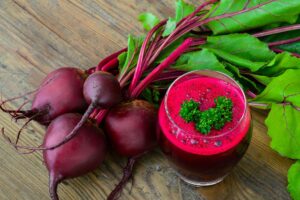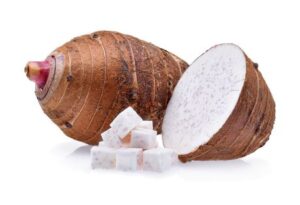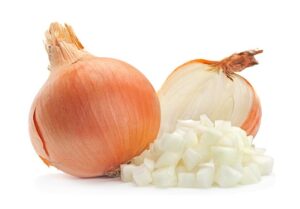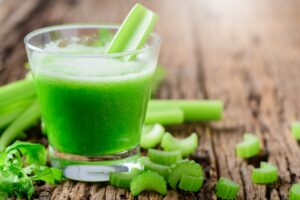Build your internal arsenal as we try to beat back COVID-19 and Non-Communicable Diseases
By Dana Malcolm
Staff Writer
#TurksandCaicos, January 19, 2022 – Imagine, your home is being attacked by a hundred thousand invaders but you have a hundred million soldiers; easy win right? Maybe not. Imagine your soldiers are too weak to pick up their swords, the fight becomes significantly harder, in fact it may become a losing battle and your quality of life or life itself is the prize.
Every day, our immune systems are engaged in these unseen battles. However, there are too many of our systems are losing to invaders like Covid-19 because they are simply not strong enough.
How do you build up your fighters to turn around a losing battle, to give your body the victory? Magnetic Media has searched out eight superfoods to help your effort.
They are easy to find and very affordable at your local grocer.
Our natural boosters list includes: Spinach, Beets, Garlic, Dasheen, Callaloo, Ginger, Onions and Celery are eight superfoods that are readily available to Islanders and are known to inject our immune systems with a serious boost.
Spinach
There’s a reason Popeye the Sailor popped open a can of this leafy green when he was in trouble. A single cup of spinach contains .86 grams of protein, 30 milligrams (mg) of calcium, .81 g of iron, 24 mg of magnesium, 167 mg of potassium, 2,813 international units of Vitamin A and 58 micrograms of folate says the United States Department of Agriculture.
spinach contains .86 grams of protein, 30 milligrams (mg) of calcium, .81 g of iron, 24 mg of magnesium, 167 mg of potassium, 2,813 international units of Vitamin A and 58 micrograms of folate says the United States Department of Agriculture.
So yes, it does make you super strong!
Spinach, delicious raw cooked or blended into smoothies helps to “improve blood glucose control in people with diabetes, lowering the risk of cancer, and improving bone health, as well as supplying minerals and vitamins that can provide a range of different benefits,” says Medical News Today.
Spinach also helps with asthma prevention and bone health, however please avoid spinach if you are using blood thinners, say medical experts.
Beets
This richly colored root vegetable has a bad reputation for not being the tastiest morsel on the plate but there are several ways to consume beets that you just might try after hearing the mounds of benefits associated with the red vegetable.
vegetable.
“Beetroot provides a wide range of possible health benefits, such as reducing blood pressure, improving digestion, and lowering the risk of diabetes. A 2019 review of studies Trusted Source found that certain compounds in beets can disrupt the cancerous mutations of cells. Such compounds include betalains, which are pigments that give beets their red and yellow color,” Medical News Today explains.
Highly recommend is making beetroot juice by peeling beetroot and blending it with a combination of fresh orange, mint, pineapple or apples, lemon, and ginger. Beets can also be roasted, steamed, boiled or pickled.
Garlic
Since the Middle Ages Europeans have used garlic for all sorts of reasons, but you would be better served popping it in your mouth than using it to ward off Count Dracula, you know the vampire guy. Mainly because garlic is widely used for several conditions linked to the blood system and the heart, including atherosclerosis (hardening of the arteries), high cholesterol, heart attack, coronary heart disease, and hypertension.
in your mouth than using it to ward off Count Dracula, you know the vampire guy. Mainly because garlic is widely used for several conditions linked to the blood system and the heart, including atherosclerosis (hardening of the arteries), high cholesterol, heart attack, coronary heart disease, and hypertension.
Medical News Today says researchers recommend raw garlic as the most effective. Cooked garlic also retained much of its properties.
Dasheen
This root vegetable also called Taro root in certain countries is Asian in origin and is similar to yams or potatoes. Dasheens contain a wealth of nutrients including Fiber, Manganese, Vitamin B6, Vitamin E, Potassium, Copper, Vitamin C, Phosphorus and Magnesium says Healthline.
Dasheens contain a wealth of nutrients including Fiber, Manganese, Vitamin B6, Vitamin E, Potassium, Copper, Vitamin C, Phosphorus and Magnesium says Healthline.
It is rich in fiber and may reduce risk of heart disease and may even assist in weight loss journeys. Dasheen can be mashed or fried as well as added to soups and stews.
Callaloo A breakfast staple in countries like Jamaica this green leafy vegetable can be added to soups or steamed with fish.
A breakfast staple in countries like Jamaica this green leafy vegetable can be added to soups or steamed with fish.
Callaloo is a good source of vitamin C. According to the Food Composition Tables for the Caribbean the vegetable provides iron, potassium, calcium, fiber, sodium, vitamin C and protein. The vegetable can reduce blood pressure and regulate heart health.
Like spinach, persons with kidney disease should avoid this vegetable as it is rich in potassium.
Ginger
Every Caribbean child has been treated with ‘a little ginger tea’ for some ailment or the other at some point in time so it’s no surprise that the spice has made the elite list.
Medical News Today says antioxidants and other nutrients in ginger may help prevent or treat arthritis, inflammation, and various types of infection. Researchers have also studied its potential to reduce the risk of diabetes, cancer, and other health problems.
Ginger has been proven to reduce gas and improve digestion as well reduce nausea and ease colds and the flu so grandma’s faith in the remedy was well placed! Ginger even helps in reducing belly fat, as it has a thermogenic effect to activate the metabolism and help in burning fat.
Ginger can be blended, drawn as a tea or incorporated into meals like stir fry.
Onions
The quintessential Caribbean spice. Whether they’re red, white or yellow, if it’s a Caribbean dish you can bet your conch shell it’s going to have onions somewhere in the mix.
However, there is more to this layered cooking staple than just its taste. Research proves onions also provide potential health benefits. These include reducing the risk of several types of cancer, improving mood, and maintaining skin and hair health. The spice also contains high levels of vitamin C B-6 and Manganese.
LifeHack.com shares that onions stops colds in their tracks, can help rid your skin of blemishes, eases the pain of bee stings, helps with detoxifying the body, lowers bad cholesterol and nourishes the brain for improved mental health.
Onions can be roasted, grilled, sautéed, caramelized or eaten raw.
Celery
One of the greatest enemy of toddlers’ dinner plates and even some adults, this crunchy veggie is another food which carries the reputation for not being the tastiest.
But whether it’s juiced, added to lunch boxes as a side or blended into smoothies this vegetable helps to prevent inflammation and lowers blood pressure.
Celery is also extremely hydrating and a good source of fiber according to Medical News Today.
It is important to note that an occasional munch on these foods will not provide serious immune support, but its seeds do offer a one two punch to germs, and a juice proves to be an excellent diuretic, supporting detox and weight loss.
Celery cleans up the liver and for the skin, it helps in reducing the appearance of wrinkles.


 Caribbean News6 days ago
Caribbean News6 days ago
 News1 week ago
News1 week ago
 Finance1 week ago
Finance1 week ago
 Crime1 week ago
Crime1 week ago
 Health1 week ago
Health1 week ago
 Crime1 week ago
Crime1 week ago
 TCI News1 week ago
TCI News1 week ago
 Africa1 week ago
Africa1 week ago

























